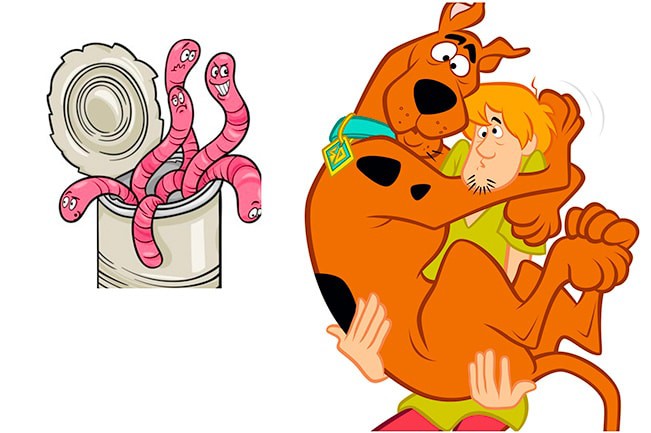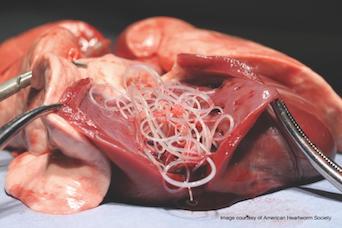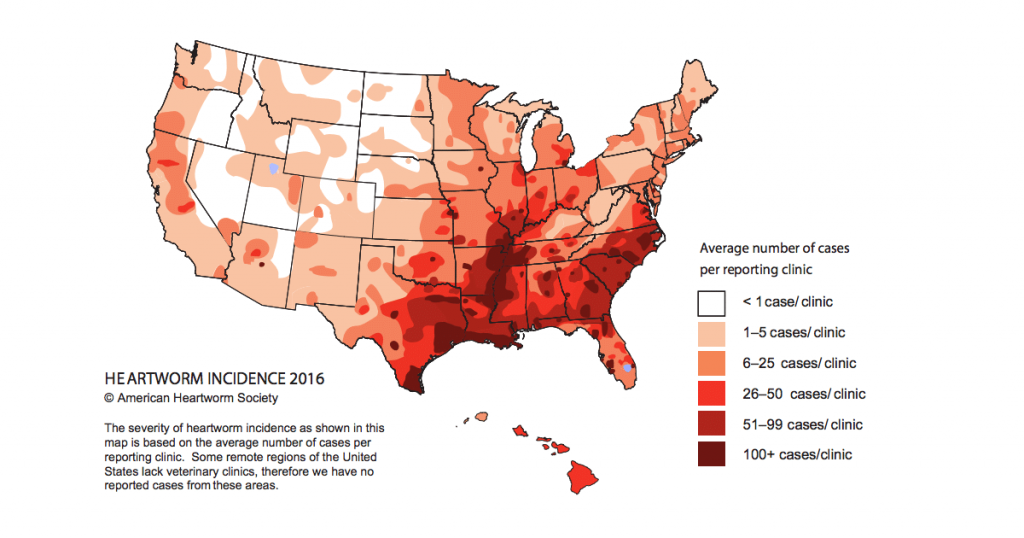
Have you ever wondered why your veterinarian has you giving your Great Dane heartworm medicine every month? Well, it’s for a good reason! Sadly, heartworms are both one of the most serious and preventable diseases affecting our canine friends.
While watching your pup frolic in the outdoors may make your heart fill with joy, it’s also potentially exposing them to mosquitoes. Itchy bites aside, mosquitoes can also transmit the larvae responsible for heartworms.
Heartworm disease is one of the most well-known diseases that not only affects dogs but other pets as well. It is estimated by the American Heartworm Society that over one million dogs in the US are affected.
It is easy to prevent, but once infected, it can be very difficult to get rid of and can even be fatal.
Although many believe location affects the likelihood of their pet contracting the disease, dogs are natural hosts to heartworms and are likely to be infected anywhere in the United States.
It is important to learn about how to prevent this common disease and the steps to take to treat your Great Dane once they have been infected.
Table of Contents
What are heartworms?
Heartworms are a type of parasitic worm that can infect the heart, lungs, and surrounding large blood vessels.
Once a dog is infected, it takes about seven months for the larvae to mature into adult heartworms. From there, they begin to reproduce and infest the heart, and the cycle continues.
Adult heartworms in dogs have been known to grow as long as 14 inches and can live up to 7 years! It’s even possible for your dog to host up to hundreds of heartworms at a time!
If the thought of this isn’t making your skin crawl, just take a look at them!

How can my Great Dane get heartworms?
If you’re worried about the likelihood of your Great Dane getting heartworm disease, it’s best to know how it’s spread. This disease can only be transmitted by mosquitoes infected with heartworm larvae.
It’s nearly impossible to know which mosquitoes could be infected so prevention is key. Dogs can get bit by mosquitoes anywhere and at any time. Seasons with warmer weather or places surrounded by water create a higher risk.
According to the American Heartworm Society, the Atlantic and Gulf Coast regions have the highest rates of heartworms. However, cases are still reported in every state of the United States each year.
They gather data from shelters and veterinary practices every three years to determine incidence trends which you can see below. Their most recent infographic is from 2016.

The only good news is that once a dog is infected, there’s no risk of spreading it. This includes other furry friends as well as humans.
That being said, it is still important that your pup starts treatment immediately. The sooner the worms are killed off, the less of a negative impact they can have on the dog’s body.
Risks of not treating heartworms
If you suspect your dog has been bit and starts to show signs of being affected, you need to take them to the vet as soon as possible to get screened and start treatment.
If left untreated, the parasitic worms can start growing uncontrollably, begin to impair heart function, and take over areas surrounding the heart. This can eventually lead to death.
Puppy owners have often believed the myth that dogs can outgrow heartworms at a young age. This couldn’t be further from the case. If not treated promptly, there is a strong likelihood they will die from the disease.
Take your Great Dane pup to the vet as soon as you presume they have heartworms to immediately start treatments.
While treatment may seem tedious and unnecessary to you, it may be the one thing that saves their life.
What are the signs that my dog might have heartworms?
When dogs are first bit by an infected mosquito, symptoms for heartworms are usually very subtle if even present at all. As the worm grows, the symptoms start to present themselves in four stages.
As the worm begins to protrude more and more into the heart and lungs, your pup can start to develop a cough. As soon as this sign is present, it is smart to take your Dane in to see a vet to get screened.
In the second stage, the dog’s cough grows more persistent and they will start to lose their ability to exercise and will become more fatigued after simple activities.
By the time the dog enters the next stage, their health will be already severely compromised. They will start to display abnormal breathing sounds and may even vomit or cough up blood.
X-rays can be taken of your dog’s heart and lungs to see if there are significant signs of infection.
If the heartworms are not treated swiftly, stage four usually results in the parasites taking over and your dog passing.
How are heartworms treated?
Medication
Fortunately, heartworms can be treated if addressed early on. Once a dog has been diagnosed with heartworms, a vet can prescribe a series of injections that start to kill the worm living inside it.
These are usually administered in sets of two or three in order to kill the adult heartworms and prevent reproduction. Vets can additionally prescribe antibiotics and steroids depending on the stage and severity of the disease.
If treating your ill dog at home, there is also the slow kill method. This is where you administer the prescribed preventative medication daily to kill off the worms.
Some studies have shown that if dog owners give ivermectin (a commonly prescribed preventative) to their dog with heartworm disease monthly for two years, they are able to kill off most of the young heartworms.
This treatment is a more budget-friendly alternative, however, because it takes a while to start killing them off, the heartworms cause permanent damage to the heart and blood vessels in the meantime.
Weighing the pros and cons of this approach is something that you should talk through with your veterinarian.
Surgery
Another option for eradicating the worms is surgery. This alternative should only be considered in severe cases where the dog will not survive otherwise.
This is a common route for a dog who has developed caval syndrome, where the worms have infected the heart and start spilling out requiring surgery for removal.
Other considerations with heartworms
One of the most important aspects surrounding treatment for heartworms is exercise restriction.
It is imperative that your pup is watched closely before, during, and after treatments for a prolonged period to make sure they don’t overdo it.
This is because, after starting treatment, the worms begin to die and break up into pieces. These can get lodged into the pulmonary vessels and cause blockages, ultimately causing death.
While infected and on treatment, dogs should only be allowed outside for short walks to go to the bathroom. If you must be away from your pet either for work or to run errands, use a crate to limit activity.
Even if your dog has been infected, and properly treated, and the worms have died off, it is still possible for them to get the disease again if they are bitten by an infected mosquito.
Prevention is the best way for you to protect your Dane from experiencing this disease.
How can I prevent my dog from getting heartworms?
Medication
There are multiple ways of making sure this preventable disease doesn’t inhabit your Great Dane. Many vets can prescribe monthly pills, topicals, and even injections you can give your dog that will protect them.
When it comes to choosing which prevention medication to use for your pup, it’s best to consider their lifestyle. Are they pretty active and love to spend most of their time outside exploring?
You may want to look for a medication that not only protects against heartworms but ticks and fleas as well.
A popular option for this method is called the “moxi-doxy” protocol. This involves the combination of two common puppy prescriptions: Advantage Multi (moxidectin) and doxycycline.
Advantage Multi for dogs is a topical ointment comprised of 10% imidacloprid and 2.5% moxidectin to protect against heartworms and fleas whereas doxycycline is an oral antibiotic.
The doxycycline is given to the dog for thirty days while Advantage Multi is applied once a month as directed. Aside from being an effective prevention technique, after 10 months of this process, you can have your dog tested by a vet to determine if the heartworm is still present.
Be sure to ask your vet about the different options available for these medications to find the one best suited for your giant furry pal.
Mosquito Repellent
In their 2018 heartworm recommendation guidelines, the American Heartworm Society also now recommends the use of EPA-approved mosquito repellents.
While the recommendation is largely targeted at high-incidence regions, it makes logical sense that doing your best to prevent mosquito bites can only help.
Keep in mind that this is not meant to be a standalone prevention option. It should still be coupled with the use of medical prevention options.
Annual Testing
While they won’t necessarily aid in the prevention of heartworms, blood tests are incredibly helpful for identifying cases before they become advanced.
These should be performed on an annual basis as part of your Great Dane’s preventative care.
Keep in mind that even when you’re providing medication on a monthly basis, it’s very possible that your Dane is left exposed by throwing up a single dose of their medication.
Without testing, you simply won’t know if they contracted heartworms during this lapse in protection.
A Wormy Conclusion
The importance of protecting your Dane against heartworms is undeniable. If you think your pup may have heartworms, a prompt trip to the vet is advised.
This disease is best caught early!
Treatment can be administered to kill off the worms before they start to mature and reproduce. Depending on the severity of your dog’s case, heartworms can be treated and eradicated for good.
Without proper care, it can lead to worse health problems and potentially death.
Prevention medication is also available through your vet in order to protect your Dane from being bit all year round. This is a simple and effective way of defending your pet from potentially life-threatening illnesses.
Not only does prevention medication save you from the headache of treating heartworms, it also saves you from the heartbreak that comes with seeing your pet suffering from a disease that could’ve been avoided.

I agree with you